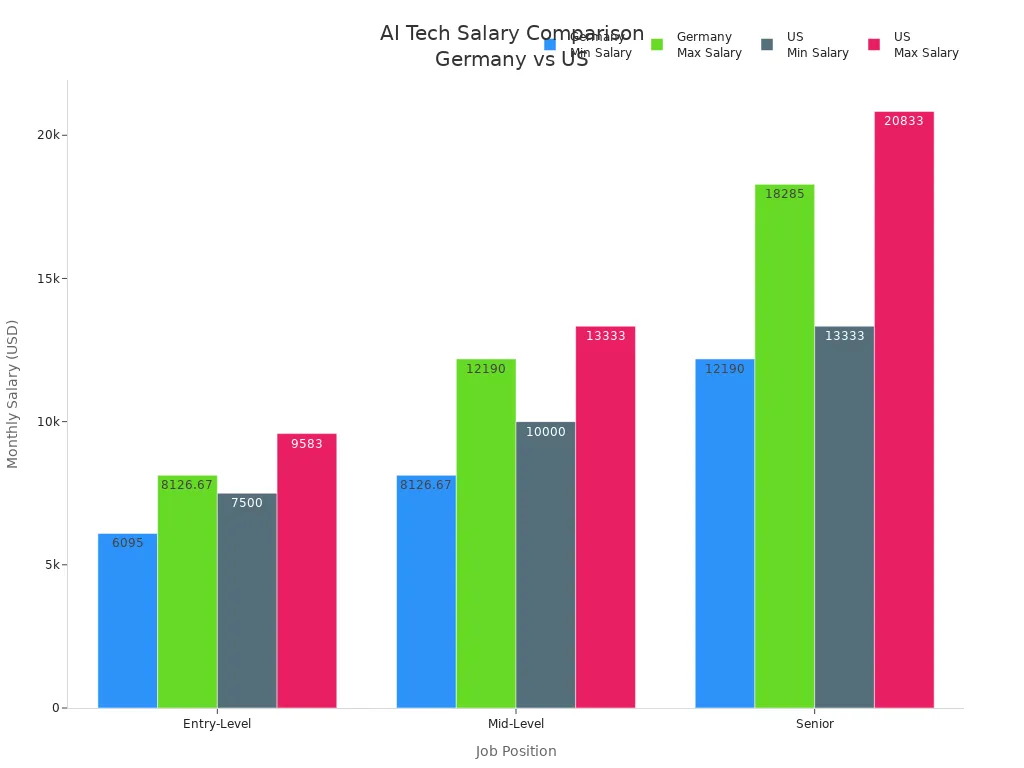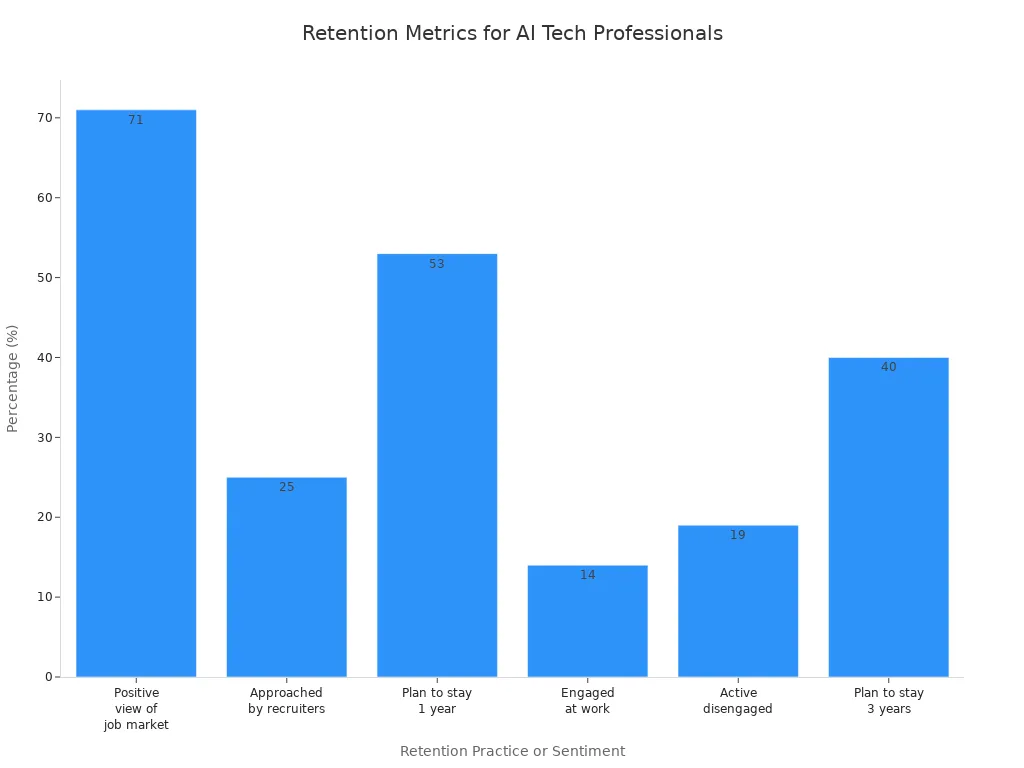AI Tech Salary in Germany vs US: Which Market Pays More?

If you work in AI tech, you will find that the US pays more than Germany for similar roles. For example, a senior AI professional in the US can earn over $20,000 each month, while in Germany, the range tops out at about $18,285. These salary differences can shape your career choices and influence where companies look for talent.
Position | Germany Salary Range (Monthly) | US Salary Range (Monthly) |
|---|---|---|
Entry-Level | $6,095 – $8,126 | $7,500 – $9,583 |
Mid-Level | $8,127 – $12,190 | $10,000 – $13,333 |
Senior | $13,333 – $20,833+ |

Salary gaps matter. You can use this information to make better choices about where to work or whom to hire. Understanding the AI Tech Salary landscape helps you plan your next move.
Key Takeaways
The US offers higher salaries for AI tech roles compared to Germany, with senior professionals earning significantly more.
Entry-level salaries in the US start around $80,000, while in Germany, they range from €50,000 to €70,000 annually.
Consider the cost of living when evaluating salaries; higher pay in the US may not translate to more disposable income compared to Germany.
The demand for AI professionals is growing in both countries, with Germany expected to reach over 32 billion euros in the AI market by 2030.
Work-life balance is generally better in Germany, with more vacation days and stronger labor protections compared to the US.
AI Tech Salary Comparison

Entry-Level Salaries
When you start your career in AI, your salary can vary a lot depending on where you work. In Germany, entry-level AI tech salaries usually range from €50,000 to €70,000 per year. Some new professionals in Germany may see offers starting at about €50,000, but in top tech cities, you might find starting salaries above €70,000. In the US, entry-level positions often begin at $80,000 or more each year. Many American companies compete for fresh AI talent, so they offer higher starting pay.
In Germany, entry-level AI tech salaries start at around €50,000 to €70,000 annually.
Germany’s tech scene in 2025 shows new tech professionals starting at €70,000+ annually.
Freshers in Germany can expect approximately €50,000 per year.
In the US, entry-level positions typically offer salaries starting at $80,000 or more.
You will notice that the US offers a higher starting point for AI tech salary. This difference can help you decide where to begin your AI career.
Mid-Level Salaries
As you gain experience, your earning potential grows. In Germany, mid-level AI tech professionals usually earn between $8,127 and $12,190 per month. This translates to about $97,500 to $146,280 per year. In the US, mid-level salaries range from $10,000 to $13,333 per month, or $120,000 to $160,000 per year. Companies in the US often reward experience with bigger pay increases. You may find that your AI tech salary grows faster in the US as you move from entry-level to mid-level roles.
Tip: If you want to maximize your earnings as you gain experience, consider how quickly salaries rise in each country.
Senior-Level Salaries
Senior AI professionals see the biggest salary differences between Germany and the US. In Germany, senior-level AI tech salary ranges from $12,190 to $18,285 per month, which equals about $146,280 to $219,420 per year. In the US, senior AI experts can earn from $13,333 up to $20,833 or more each month. That means you could make $160,000 to over $250,000 per year in the US. Top US companies often pay even more for leaders in AI, especially in major tech hubs.
If you aim for a senior role, you will likely see a much higher AI tech salary in the US compared to Germany. This gap can influence your long-term career plans and where you choose to work.
Note: Salary is only one part of your decision. You should also think about cost of living, job security, and work-life balance.
Factors Affecting Pay
Cost of Living
You should always consider the cost of living when comparing salaries. A high salary in one city may not go as far as a lower salary in another. For example, living in New York or San Francisco costs much more than living in Berlin. The table below shows how much money you might keep after paying for basic expenses in each city.
City | Average Salary | Cost of Living | Disposable Income |
|---|---|---|---|
New York, NY | $110,138 | $67,852 | $11,894 |
San Francisco, CA | $119,203 | $57,406 | $25,567 |
Berlin, Germany | $73,730 | $25,509 | $48,032 |
Amsterdam, NL | $71,016 | $32,331 | $50,950 |
You can see that Berlin offers a lower cost of living, so your money goes further even if the salary is lower. Housing in German cities like Berlin or Munich is often less expensive than in US tech hubs. For example, rent for a one-bedroom apartment in Berlin averages €1,000 per month, while in Munich it can reach €1,500. Public transport in Germany also costs less, with monthly passes between €70 and €90. Healthcare is more affordable too, as public health insurance covers most services.
Market Demand
The demand for AI professionals keeps rising in both Germany and the US. You will find that:
The AI market in Germany is growing fast, expected to reach over 32 billion euros by 2030.
The German government supports AI through programs like the National AI Competence Center.
AI job listings have jumped by 68% worldwide since late 2022, showing strong demand for your skills.
This high demand can push up AI Tech Salary offers, especially in cities with many tech companies.
Company Type
The type of company you work for can change your pay. Large tech firms and global companies often pay more than startups or smaller businesses. In the US, big names like Google or Microsoft offer higher salaries and bonuses. In Germany, international companies may pay more than local firms, but you might find better job security and work-life balance at smaller companies.
Tip: If you want a higher salary, look for roles at large or international companies.
Benefits
Salary is important, but benefits also matter. In Germany, you get public health insurance if you earn below €69,300, with your employer paying half the premium. You also join a public pension system, which helps you save for retirement. German workers receive at least 20 days of paid vacation each year. In the US, health insurance and retirement plans depend on your employer, and paid leave is not guaranteed. These differences can affect your total compensation and quality of life.
Job Seeker Implications
Relocation
When you think about moving for an AI tech job, you need to look at more than just salary. Both Germany and the US offer strong opportunities, but each country has its own set of rules and benefits. Germany faces a shortage of 137,000 IT specialists, so you will find many open positions. You also get to enjoy a clean environment, efficient public services, and high rankings in happiness and well-being. However, you may face language barriers and some bureaucratic steps when you first arrive.
Germany has a strong demand for tech talent.
You can expect a high quality of life with good public services.
Language and paperwork can be challenging at first.
If you plan to work in Germany, you will need the right visa or work permit. Here is a quick look at your options:
Visa Type | Requirements |
|---|---|
EU Blue Card | Academic degree and a job contract meeting minimum salary requirements. |
Work visa for qualified professionals | Recognized training or degree in IT. |
Visa for professionally experienced workers | Proof of work experience in IT, even without formal qualifications. |
Opportunity Card (Chancenkarte) | Lets you enter Germany for up to one year to look for a job, even without a prior job offer. |
Career Growth
You will find many ways to grow your career in Germany’s AI sector. The job market is expanding across fields like automotive, healthcare, finance, and manufacturing. Even entry-level jobs offer competitive pay. Germany’s education system also supports your learning, with AI now part of many university programs.
Aspect | Germany |
|---|---|
Job Market | |
Salary Competitiveness | Strong pay, even for new professionals |
Fastest-Growing Sectors | Automotive, healthcare, finance, manufacturing |
Education | Good access to AI-focused courses and training |
Work-Life Balance
You will notice a big difference in work-life balance between Germany and the US. In Germany, people often “work to live.” Strong labor laws protect your time off and limit your weekly hours. You get more vacation days and lower stress. In the US, many tech workers “live to work,” which can lead to higher burnout.
Germany supports work-life balance with strong labor protections and mandatory vacation.
EU rules limit weekly working hours, helping you avoid burnout.
The US has fewer protections, so tech workers often face more stress.
Tip: If you value your free time and well-being, Germany’s work culture may suit you better.
Employer Implications
Talent Attraction
You want to attract the best AI tech talent. Many companies now use smart tools to help with hiring. For example, Siemens uses AI to speed up hiring and give faster feedback to candidates. This makes your company look modern and efficient.
Here are some ways you can attract top talent:
Use AI tools to find candidates on different online platforms.
Let AI screen resumes and match people to jobs quickly.
Try predictive analytics to see what skills you will need in the future.
Train your HR team to use new technology well.
These steps help you find the right people faster. They also make the hiring process smoother for everyone.
Compensation Strategy
You need a strong pay plan to compete in the AI job market. Salaries in the US are higher than in Germany, but cost of living and benefits also matter. You should look at what other companies offer and adjust your pay to match or beat them. Think about more than just money. Offer good health insurance, flexible hours, and chances to learn new skills. These extras can help you stand out.
Tip: Review your pay and benefits every year. This helps you keep up with changes in the market.
Retention
Keeping your AI tech team happy is just as important as hiring them. Many workers feel good about the job market. About 71% have a positive view. Still, only 53% plan to stay with their employer for one year, and just 40% want to stay for three years. This means you need to work hard to keep your team engaged.
Metric | Value |
|---|---|
Positive view of job market | 71% |
Employees approached by recruiters | 25% |
Employees planning to stay with current employer (1 year) | 53% |
Employees engaged at work | 14% |
Active disengaged employees | 19% |
Employees planning to stay with current employer (3 years) | 40% |

You can improve retention by offering clear career paths, regular feedback, and a healthy work-life balance. When your team feels valued, they are more likely to stay and do their best work.
Salary Overview Table

Germany vs US
You want a clear view of how pay compares in both countries. This table gives you a quick look at monthly and yearly salaries for AI tech roles in Germany and the US. You can use this as a reference when you plan your next career step or hiring decision.
Role | Germany (Monthly) | Germany (Yearly) | US (Monthly) | US (Yearly) |
|---|---|---|---|---|
Entry-Level | $6,095 – $8,126 | $73,140 – $97,512 | $7,500 – $9,583 | $90,000 – $115,000 |
Mid-Level | $8,127 – $12,190 | $97,524 – $146,280 | $10,000 – $13,333 | $120,000 – $160,000 |
Senior | $12,190 – $18,285 | $146,280 – $219,420 | $13,333 – $20,833+ | $160,000 – $250,000+ |
Use this table to compare your current pay or job offer with the market average. You can see that the US offers higher salaries at every level, but Germany still provides strong pay, especially when you consider cost of living and benefits.
The numbers above reflect gross salaries before taxes and deductions.
Actual pay may vary based on your skills, company, and city.
AI Tech Salary trends can change each year, so check for updates often.
This overview helps you make smart choices about where to work or hire. You can see the differences at a glance and decide what matters most for your goals.
You now see that the US leads in AI Tech Salary, offering higher pay at every level. Many factors shape your decision, such as experience, city, industry, and company size.
Cities like Zurich and London pay well, but Berlin and Amsterdam offer balance and strong packages.
Roles like AI research scientist and NLP engineer are growing fast.
Sectors like finance and pharma pay more, and large firms often give better compensation.
If you want to boost your career or hire top talent, compare locations, roles, and benefits before making your move.
FAQ
What skills help you earn more in AI tech?
You can boost your salary by learning Python, machine learning, and deep learning. Experience with cloud platforms and data engineering also helps. Employers value strong problem-solving and communication skills.
Do you need a degree to get a high-paying AI job?
A degree helps, but you can get good jobs with strong skills and experience. Many companies hire people with coding bootcamps or self-taught backgrounds if you show real project work.
Can you negotiate your AI tech salary?
Yes, you can negotiate. Research average salaries for your role and location. Show your skills and achievements. Be ready to explain why you deserve a higher offer.
Is remote work common for AI tech jobs?
Many AI tech jobs offer remote work. You can work from home or anywhere with a good internet connection. Some companies may ask you to visit the office sometimes.
See Also
Analyzing Amazon Go Versus Cloudpick: A Detailed Comparison
Understanding The Expenses Associated With Vending Machines
Vending Machine Engineers: Merging Mechanical Skills With Software Knowledge
Evaluating The Expenses Involved In Custom Vending Machines
Finding Top Micro Market And Vending Options For Your Business
